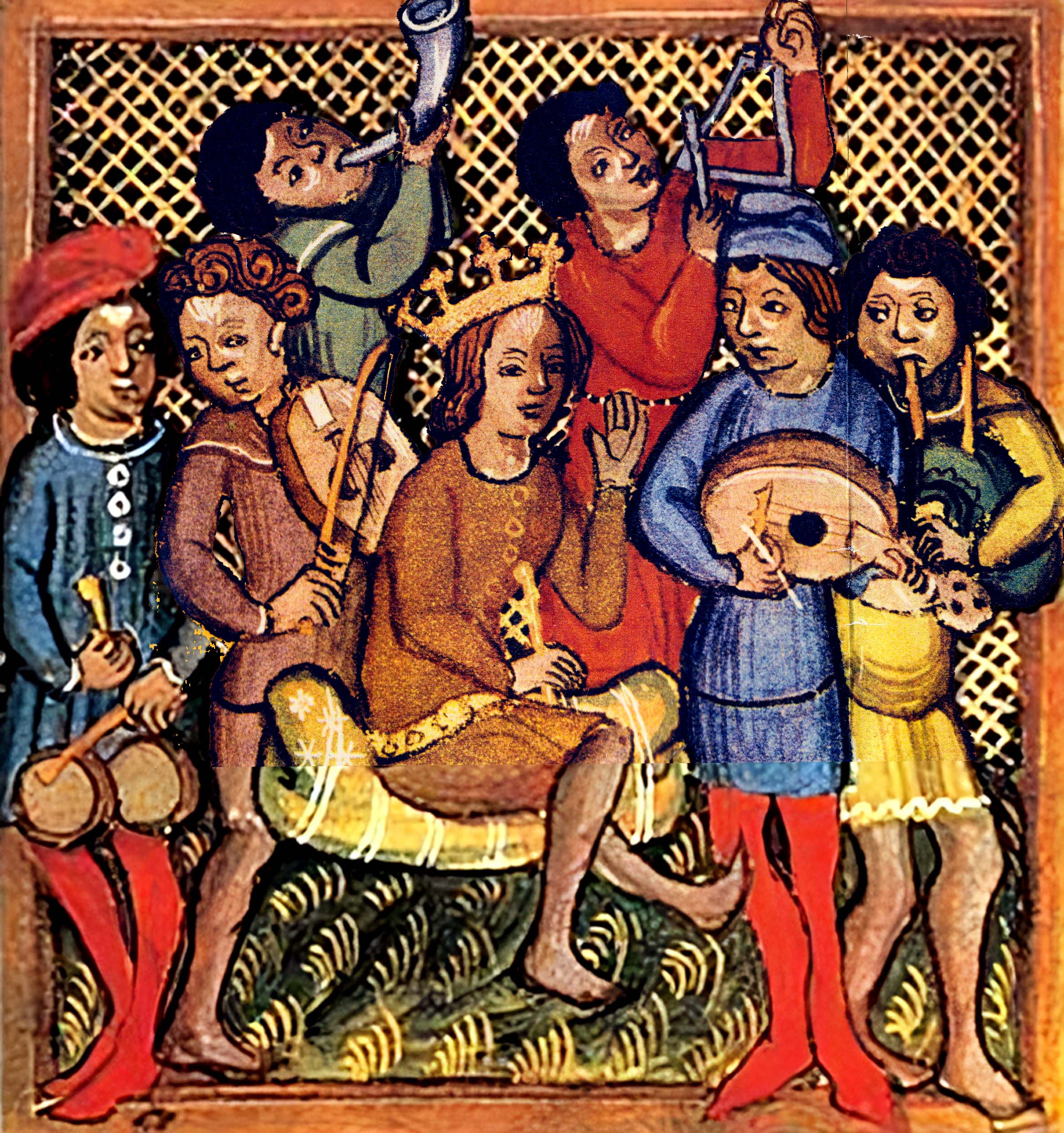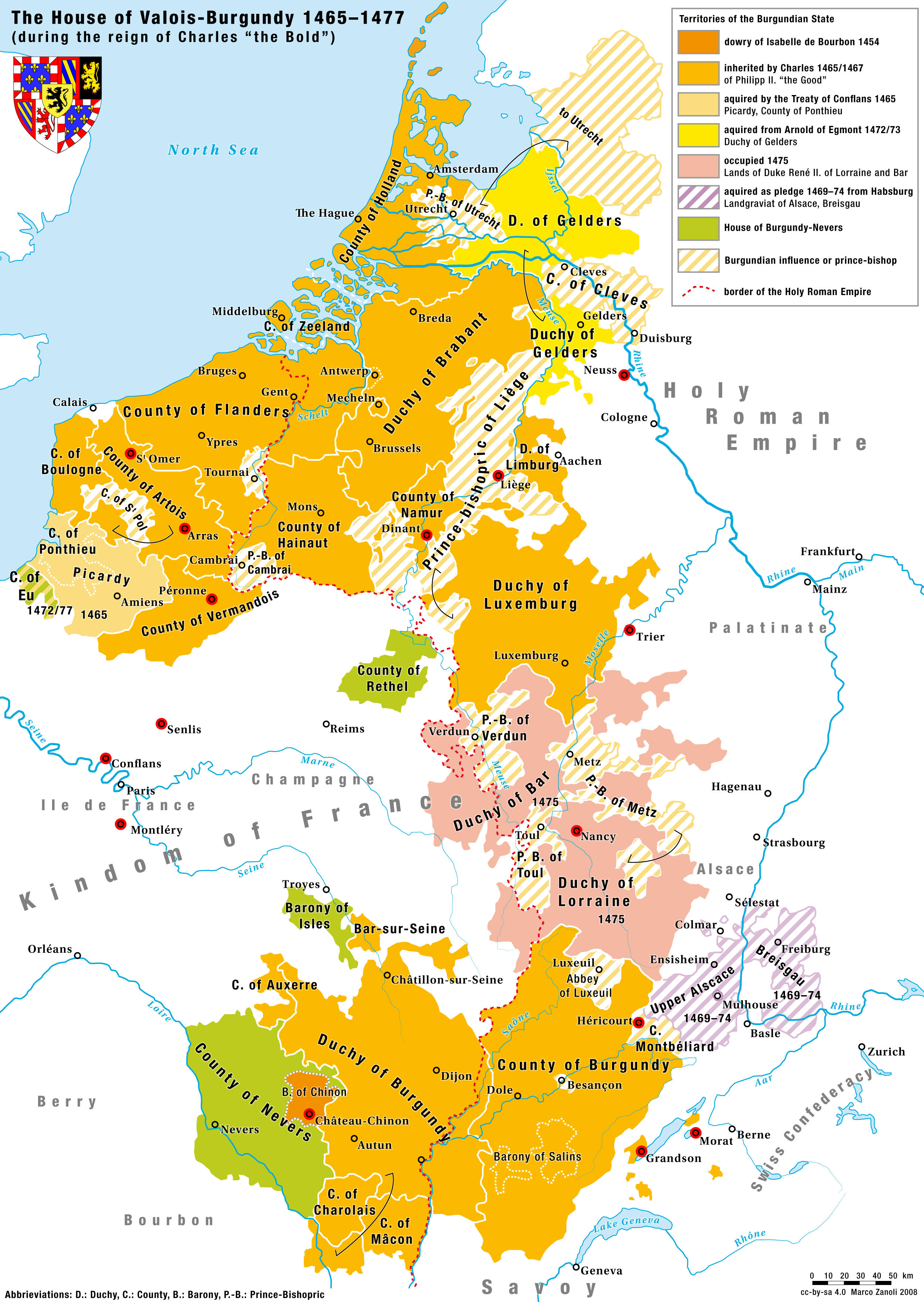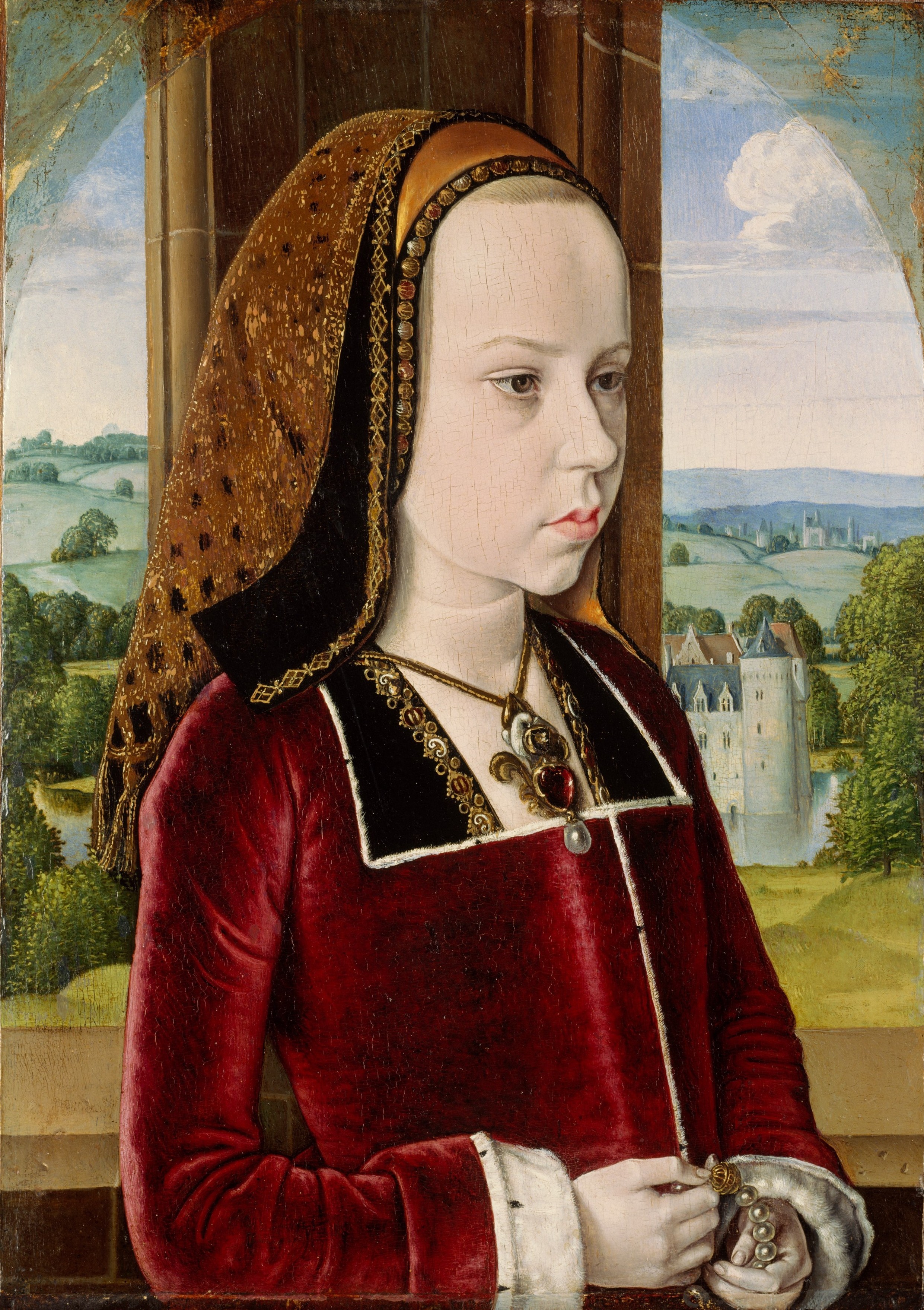|
Pierre Fontaine (composer)
Pierre Fontaine (; c. 1380 – c. 1450) was a French composer of the transitional era between the late Middle Ages and early Renaissance, and a member of the Burgundian School of composers. While he was well known at the time, most of his music has probably been lost. All of his surviving music is secular, and all his compositions are chansons. Life He was born in Rouen and is presumed to have had his early musical training there. By 1403 he was a singer at the large and splendid chapel of Philip the Bold, and after it was disbanded in 1404 he became a clerk at Ste. Chapelle in Bourges, where he served at least until 1407. He was a singer at the court chapel of Burgundy when it was reconstituted, after a period of inactivity, by John the Fearless, the new Duke of Burgundy in 1415. When John died in 1419 Fontaine left the chapel and went to northern Italy, joining the singers in the chapel of Pope Martin V, where he probably remained through the early 1420s. Around the end ... [...More Info...] [...Related Items...] OR: [Wikipedia] [Google] [Baidu] |
Medieval Music
Medieval music encompasses the sacred and secular music of Western Europe during the Middle Ages, from approximately the 6th to 15th centuries. It is the first and longest major era of Western classical music and followed by the Renaissance music; the two eras comprise what musicologists generally term as early music, preceding the common practice period. Following the traditional division of the Middle Ages, medieval music can be divided into Early (500–1150), High (1000–1300), and Late (1300–1400) medieval music. Medieval music includes liturgical music used for the church, and secular music, non-religious music; solely vocal music, such as Gregorian chant and choral music (music for a group of singers), solely instrumental music, and music that uses both voices and instruments (typically with the instruments accompanying the voices). Gregorian chant was sung by monks during Catholic Mass. The Mass is a reenactment of Christ's Last Supper, intended to provide a ... [...More Info...] [...Related Items...] OR: [Wikipedia] [Google] [Baidu] |
Sackbut
The term sackbut refers to the early forms of the trombone commonly used during the Renaissance music, Renaissance and Baroque music, Baroque eras. A sackbut has the characteristic telescopic slide of a trombone, used to vary the length of the tube to change Pitch (music), pitch, but is distinct from later trombones by its smaller, more cylindrically-proportioned bore (wind instruments), bore, and its less-flared bell (wind instrument), bell. Unlike the earlier slide trumpet from which it evolved, the sackbut possesses a U-shaped slide with two parallel sliding tubes, rather than just one. Records of the term ''trombone'' predate the term ''sackbut'' by two decades, and evidence for the German term ''Posaune'' is even older.Timeline of trombone history (15th century) ... [...More Info...] [...Related Items...] OR: [Wikipedia] [Google] [Baidu] |
1450s Deaths
*
{{Number disambiguation ...
145 may refer to: *145 (number), a natural number *AD 145, a year in the 2nd century AD * 145 BC, a year in the 2nd century BC *145 (dinghy), a two-person intermediate sailing dinghy * 145 (South) Brigade * 145 (New Jersey bus) See also * List of highways numbered 145 The following highways are numbered 145: Australia * Lower Barrington Road, Paloona Road, Melrose Road, Bellamy Road, Forthside Road (Tasmania) * Inverleigh–Winchelsea Road (Victoria) Canada * Winnipeg Route 145 * New Brunswick Route 145 * ... [...More Info...] [...Related Items...] OR: [Wikipedia] [Google] [Baidu] |
1380s Births
138 may refer to: *138 (number) *138 BC *AD 138 Year 138 ( CXXXVIII) was a common year starting on Tuesday (link will display the full calendar) of the Julian calendar. At the time, it was known as the Year of the Consulship of Niger and Camerinus (or, less frequently, year 891 ''Ab urbe con ... * 138 (New Jersey bus) {{numberdis ... [...More Info...] [...Related Items...] OR: [Wikipedia] [Google] [Baidu] |
Burgundian School Composers
Burgundian can refer to any of the following: *Someone or something from Burgundy. * Burgundians, an East Germanic tribe, who first appear in history in South East Europe. Later Burgundians colonised the area of Gaul that is now known as Burgundy (French Bourgogne) *The Old Burgundian language (Germanic), an East Germanic language spoken by the Burgundians *The Modern Burgundian language (Oïl), an Oïl language also known as spoken in the region of Burgundy, France. * Frainc-Comtou dialect, sometimes regarded as part of the Burgundian group of languages *Burgundian (party) The Burgundian party was a political allegiance against France that formed during the latter half of the Hundred Years' War. The term "Burgundians" refers to the supporters of the Duke of Burgundy, John the Fearless, that formed after the assa ..., a political faction in early 15th century during the Hundred Years' War See also * Burgundian War (other) {{disambiguation Language and nationalit ... [...More Info...] [...Related Items...] OR: [Wikipedia] [Google] [Baidu] |
Renaissance Composers
The Renaissance ( , ) , from , with the same meanings. is a Periodization, period in History of Europe, European history marking the transition from the Middle Ages to modernity and covering the 15th and 16th centuries, characterized by an effort to revive and surpass ideas and achievements of classical antiquity. It occurred after the Crisis of the Late Middle Ages and was associated with great social change. In addition to the standard periodization, proponents of a "long Renaissance" may put its beginning in the 14th century and its end in the 17th century. The traditional view focuses more on the Early modern period, early modern aspects of the Renaissance and argues that it was a break from the past, but many historians today focus more on its medieval aspects and argue that it was an extension of the Middle Ages. However, the beginnings of the period – the early Renaissance of the 15th century and the Italian Italian Renaissance painting#Proto-Renaissance painting, Pr ... [...More Info...] [...Related Items...] OR: [Wikipedia] [Google] [Baidu] |
French Male Classical Composers
French (french: français(e), link=no) may refer to: * Something of, from, or related to France ** French language, which originated in France, and its various dialects and accents ** French people, a nation and ethnic group identified with France ** French cuisine, cooking traditions and practices Fortnite French places Arts and media * The French (band), a British rock band * "French" (episode), a live-action episode of ''The Super Mario Bros. Super Show!'' * ''Française'' (film), 2008 * French Stewart (born 1964), American actor Other uses * French (surname), a surname (including a list of people with the name) * French (tunic), a particular type of military jacket or tunic used in the Russian Empire and Soviet Union * French's, an American brand of mustard condiment * French catheter scale, a unit of measurement of diameter * French Defence, a chess opening * French kiss, a type of kiss involving the tongue See also * France (other) * Franch, a surname * French ... [...More Info...] [...Related Items...] OR: [Wikipedia] [Google] [Baidu] |
French Classical Composers
French (french: français(e), link=no) may refer to: * Something of, from, or related to France ** French language, which originated in France, and its various dialects and accents ** French people, a nation and ethnic group identified with France ** French cuisine, cooking traditions and practices Fortnite French places Arts and media * The French (band), a British rock band * "French" (episode), a live-action episode of ''The Super Mario Bros. Super Show!'' * ''Française'' (film), 2008 * French Stewart (born 1964), American actor Other uses * French (surname), a surname (including a list of people with the name) * French (tunic), a particular type of military jacket or tunic used in the Russian Empire and Soviet Union * French's, an American brand of mustard condiment * French catheter scale, a unit of measurement of diameter * French Defence, a chess opening * French kiss, a type of kiss involving the tongue See also * France (other) * Franch, a surname * Frenc ... [...More Info...] [...Related Items...] OR: [Wikipedia] [Google] [Baidu] |
Gustave Reese
Gustave Reese ( ; 29 November 1899 – 7 September 1977) was an American musicologist and teacher. Reese is known mainly for his work on medieval and Renaissance music, particularly with his two publications ''Music in the Middle Ages'' (1940) and ''Music in the Renaissance'' (1954); these two books remain the standard reference works for these two eras, with complete and precise bibliographical material, allowing for almost every piece of music mentioned to be traced back to a primary source. Early life and education Reese was born in New York City on 29 November 1899. He was an avid scholar and had interests in many areas outside music, including art, architecture, and literature. He studied law at New York University, graduating in 1921. Though he was admitted to the New York State Bar, he opted to re-enroll and pursue a Bachelor of Music from NYU, which he received in 1930. Career In 1927, however, he was already teaching classes at the university in medieval and Renaiss ... [...More Info...] [...Related Items...] OR: [Wikipedia] [Google] [Baidu] |
Charles The Bold
Charles I (Charles Martin; german: Karl Martin; nl, Karel Maarten; 10 November 1433 – 5 January 1477), nicknamed the Bold (German: ''der Kühne''; Dutch: ''de Stoute''; french: le Téméraire), was Duke of Burgundy from 1467 to 1477. Charles's main objective was to be crowned king by turning the growing Burgundian State into a territorially continuous kingdom. He declared himself and his lands independent, bought Upper Alsace and conquered Zutphen, Guelders and Lorraine, uniting at last Burgundian northern and southern possessions. This caused the enmity of several European powers and triggered the Burgundian Wars. Charles's early death at the Battle of Nancy at the hands of Swiss mercenaries fighting for René II, Duke of Lorraine, was of great consequence in European history. The Burgundian domains, long wedged between the Kingdom of France and the Habsburg Empire, were divided, but the precise disposition of the vast and disparate territorial possessions involved ... [...More Info...] [...Related Items...] OR: [Wikipedia] [Google] [Baidu] |
Margaret Of Austria, Duchess Of Savoy
Archduchess Margaret of Austria (german: Margarete; french: Marguerite; nl, Margaretha; es, Margarita; 10 January 1480 – 1 December 1530) was Governor of the Habsburg Netherlands from 1507 to 1515 and again from 1519 to 1530. She was the first of many female regents in the Netherlands. Childhood and life in France Margaret was born on 10 January 1480 and named after her stepgrandmother, Margaret of York. She was the second child and only daughter of Maximilian of Austria (future Holy Roman Emperor) and Mary of Burgundy, co-sovereigns of the Low Countries. In 1482, her mother died and her three-year-old brother Philip the Handsome succeeded her as sovereign of the Low Countries, with her father as his regent. The same year her mother died, King Louis XI of France signed the Treaty of Arras, whereby her father promised to give her hand in marriage to Louis' son, Dauphin Charles. The engagement took place in 1483. With Franche-Comté and Artois as her dowry, Margaret was ... [...More Info...] [...Related Items...] OR: [Wikipedia] [Google] [Baidu] |
Basse Danse
The ''basse danse'', or "low dance", was a popular court dance in the 15th and early 16th centuries, especially at the Burgundian court. The word ''basse'' describes the nature of the dance, in which partners move quietly and gracefully in a slow gliding or walking motion without leaving the floor, while in livelier dances both feet left the floor in jumps or leaps. The basse danse was a precursor of the pavane as a dignified processional dance. The term may apply to the dance or the music alone. History The earliest record of a basse danse is found in an Occitan poem of the 1320s by Raimon de Cornet, who notes that the ''joglars'' performed them. The ''bassa danza'' is described in the dance treatise of Guglielmo Ebreo da Pesaro, in northern Italy towards the end of the 15th century, and by his friend Antonio Cornazzano, for whom it was the queen of all dance measures, low dance to be contrasted with the ''alta danza'', the "high" or leaping dance called the ''saltarello''. ... [...More Info...] [...Related Items...] OR: [Wikipedia] [Google] [Baidu] |





